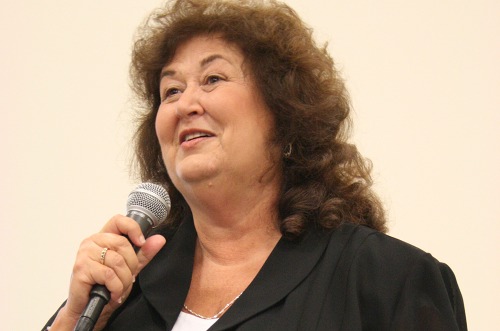FERNDALE – There's a country song that sums it up well. "There ought to be a hall of fame for mamas."
So often in the LGBT community, it's the mothers of heroes and martyrs who become the accidental activists left behind to keep their loved ones' memories alive. And if such an institution existed to pay them the tribute they so rightly deserve, surely among the first batch of inductees would be Jeanne White-Ginder.
When her 13-year-old son Ryan, a hemophiliac, was diagnosed with AIDS in 1984, White-Ginder's world went into a tailspin. Little was known about the disease at the time. Life expectancy rates were short, funding for research was nil and the general outlook was grim.
"Because there was no information, people thought you could get it from tears and saliva," White-Ginder told a crowd of about 75 on June 12 at a town hall meeting at Affirmations in Ferndale. "All you saw of HIV/AIDS on TV were people on their deathbed."
The town hall was co-sponsored by AIDS Partnership Michigan in collaboration with the Michigan Department of Community Health and the HIV/AIDS Alliance of Michigan. In introducing White-Ginder, APM Executive Director Barb Murray called her "the nicest woman" she had ever met. Indeed, in her hour-long lecture, White-Ginder's gentleness, compassion and humility shined through.
"I'm just a mom," she said. "I don't consider myself a professional speaker. All because of a misunderstood disease my life changed overnight."
Ryan White contracted the AIDS virus after being treated with a contaminated batch of Factor VIII, a blood product created from pooled plasma of non-hemophiliacs that was commonly used to treat hemophiliacs at the time.
"Little did we know that the treatment we thought was saving his life would end up taking it," White-Ginder said, "because Factor VIII contained the HIV virus."
Practically from the moment he was diagnosed, Ryan was ostracized in his hometown of Kokomo, Ind. Given only six months to live, Ryan's doctors were amazed when his health improved dramatically. So much so that Ryan planned to return to school. Parents, students and even educators at his middle school protested this move and banned him from the school's grounds. The Whites were hounded and harassed everywhere they went.
But Ryan refused to give up. An attorney took his case, which he later won, for free. And the media coverage it garnered made him a national celebrity. He was befriended by the likes of Michael Jackson and Sir Elton John, and became a powerful voice for the budding epidemic.
"Ryan took it upon himself to fight for everyone who had AIDS," said White-Ginder. "What made Ryan famous was his fight to stay in school. But my priority was keeping him alive."
The determined mother went on a mission to learn all she could about the AIDS virus, and was surprised when Ryan's doctors referred her to amfAR, the Foundation for AIDS Research, and members of the gay community.
"He said, 'I know you're a Christian woman, but the people who know the most about this disease are the gay community,'" White-Ginder recalled. "I was very homophobic. I didn't know anyone who was gay, but I was always taught that it was wrong to be. But this AIDS epidemic changed my life and it changed (my views) forever."
Soon, one overwhelming truth was apparent to her: "Once you have AIDS, you're just like everyone who has AIDS," she said. "You're just fighting to stay alive."
White-Ginder said the support she received from the gay community was enormous.
"I lost faith in the church but I never lost my faith," she said. "The involvement that I've had with the gay community has been one of the greatest blessings of my life."
In April 1990, Ryan lost his battle with AIDS after living with the disease for five-and-a-half years. Shortly after, White-Ginder was approached Sen. Edward Kennedy (D-Mass.) and Sen. Orin Hatch (R-Utah). The senators asked her permission to name the first comprehensive AIDS treatment funding bill the Ryan White Comprehensive AIDS Resources Emergency Act. The senators asked White-Ginder to travel to Washington to help lobby for the bill's passage.
"I said, 'Oh, no. Ryan used to do that. Not me,'" she said. "I thought I would hurt the cause more than I would help it."
But when she was eventually persuaded to speak with more than 25 senators about the cause, White-Ginder found she had a natural calling.
"I didn't feel like I did a great job, but for the first time I thought that maybe I had something to give to the AIDS epidemic," she recalled.
Today, nearly 20 years later, she's still giving, touching audiences by sharing her tender memories of her son's struggle. "He will be a part of my life forever," she said. "He will never go away."











